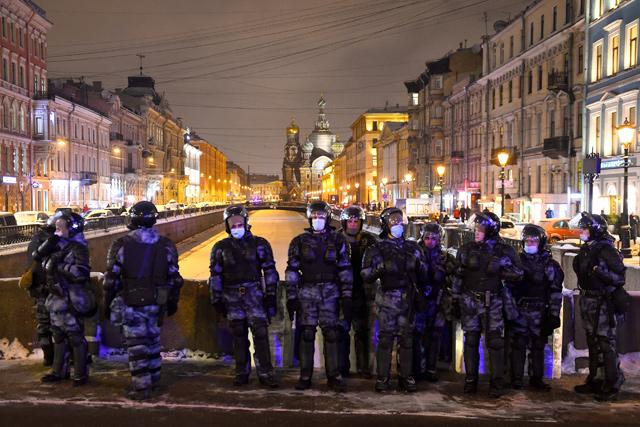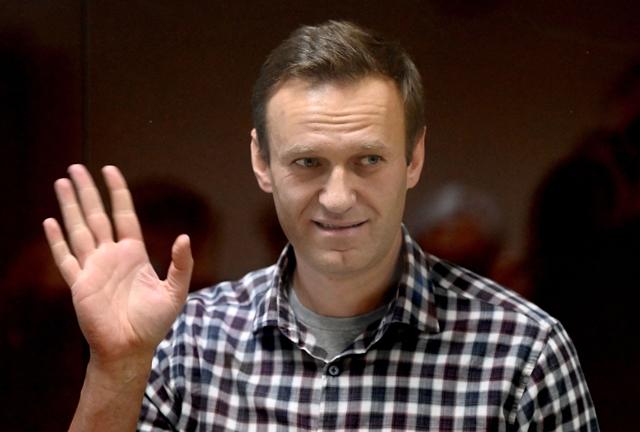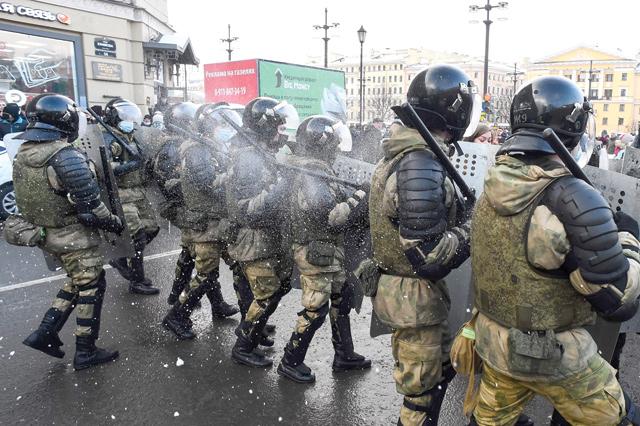You are here
Russian court sends Kremlin critic Navalny to prison despite outcry
By AFP - Feb 02,2021 - Last updated at Feb 02,2021

Law enforcement officers are seen deployed in downtown Saint Petersburg to prevent possible protests of Alexei Navalny’s supporters as the Moscow City Court holds the trial of the Russian opposition leader, charged with violating the terms of a 2014 suspended sentence for embezzlement, on Tuesday (AFP photo)
MOSCOW — A Moscow court on Tuesday ordered Kremlin critic Alexei Navalny jailed for more than two years, locking up President Vladimir Putin’s best-known opponent in defiance of mass protests and a Western outcry.
The decision to turn a 2014 suspended sentence into real jail time will see Navalny, a 44-year-old anti-corruption campaigner who accuses the Kremlin of poisoning him last year serve a lengthy prison term for the first time.
It is likely to set off new protests after thousands joined nationwide demonstrations over the last two weekends, and to further inflame tensions with Western governments who have been demanding his release.
Judge Natalya Repnikova ordered a suspended three-and-a-half-year sentence Navalny received on fraud charges in 2014 to be changed to time in a penal colony, an AFP journalist at the courthouse said.
Repnikova said time Navalny previously spent under house arrest in the sentence would count as time served, and, according to his team, that would mean at least two-and-a-half years in prison now.
Navalny’s Anti-Corruption Fund (FBK) immediately called for a protest in central Moscow.
“We’re going to the centre of Moscow right now,” it wrote on Twitter, urging supporters to join them.
In a fiery courtroom speech ahead of the ruling, Navalny accused Putin of trying to intimidate his critics and mocked the Russian leader over allegations the Novichok nerve agent used to poison him had been placed in his underwear.
“They are putting one person behind bars to scare millions,” Navalny said.
While Putin wanted to be seen as a great statesman, Navalny said, the Russian leader instead “will go down in history as a poisoner of underpants”.
Navalny was detained at a Moscow airport on January 17 when he returned from Germany, where he had spent months recovering from the August poisoning.
He was charged with violating the terms of his parole under the 2014 suspended sentence on fraud charges because he did not check in with the prison service while in Germany.
The European Court of Human Rights in 2017 condemned the initial ruling in the fraud case as “arbitrary and manifestly unreasonable”.
Police on Moscow streets
AFP journalists in Moscow saw police in full riot gear deployed in parts of Moscow and Saint Petersburg ahead of the ruling.
Tens of thousands have taken to the streets of Moscow and other Russian cities over the last two weekends to call for Navalny’s release, prompting a massive police clampdown that saw several thousand people arrested.
Police detained more protesters outside the courtroom on Tuesday, with OVD-Info, a group that monitors arrests and opposition protests, saying more than 300 people including journalists had been detained.
Russian security forces mounted a massive operation during the most recent protest on Sunday, blocking off parts of central Moscow and detaining more than 5,400 people across the country.
Navalny’s arrest and the mass detentions have triggered a wave of condemnation from the West, with many leaders calling for his release and some urging new sanctions against Moscow.
European Union Foreign Policy Chief Josep Borrell is expected to raise the issue of Navalny during a visit this week to Moscow.
Kremlin spokesman Dmitry Peskov said on Tuesday there was no reason Navalny’s detention should affect Russia’s ties with European countries.
“We hope that such nonsense as linking the prospects of Russia-EU relations with the resident of a detention centre will not happen,” he told reporters, in keeping with a Kremlin tradition of never using Navalny’s name.
Anti-corruption investigations
While he has never held elected office, Navalny has made a name for himself with anti-graft investigations exposing the wealthy lifestyles of Russia’s elite.
Two days after he was placed in pre-trial custody last month, his team released an investigation into an opulent seaside property Navalny claims was given to Putin through a billion-dollar scheme financed by close associates who head state companies.
The probe was published alongside a YouTube video report that has garnered more than 100 million views.
Putin denied owning the property and last week a billionaire businessman close to the Russian leader, Arkady Rotenberg, said he was the owner and was turning it into a hotel.
Related Articles
MOSCOW — Russia on Tuesday added jailed Kremlin critic Alexei Navalny and a number of his allies to a list of “terrorists and extremists”, a
MOSCOW — Russian prosecutors on Monday backed a request to imprison opposition leader Alexei Navalny for several years on old embezzlement c
MOSCOW — A Moscow court on Saturday upheld a ruling to jail the Kremlin’s most prominent opponent Alexei Navalny, sealing his first lengthy













